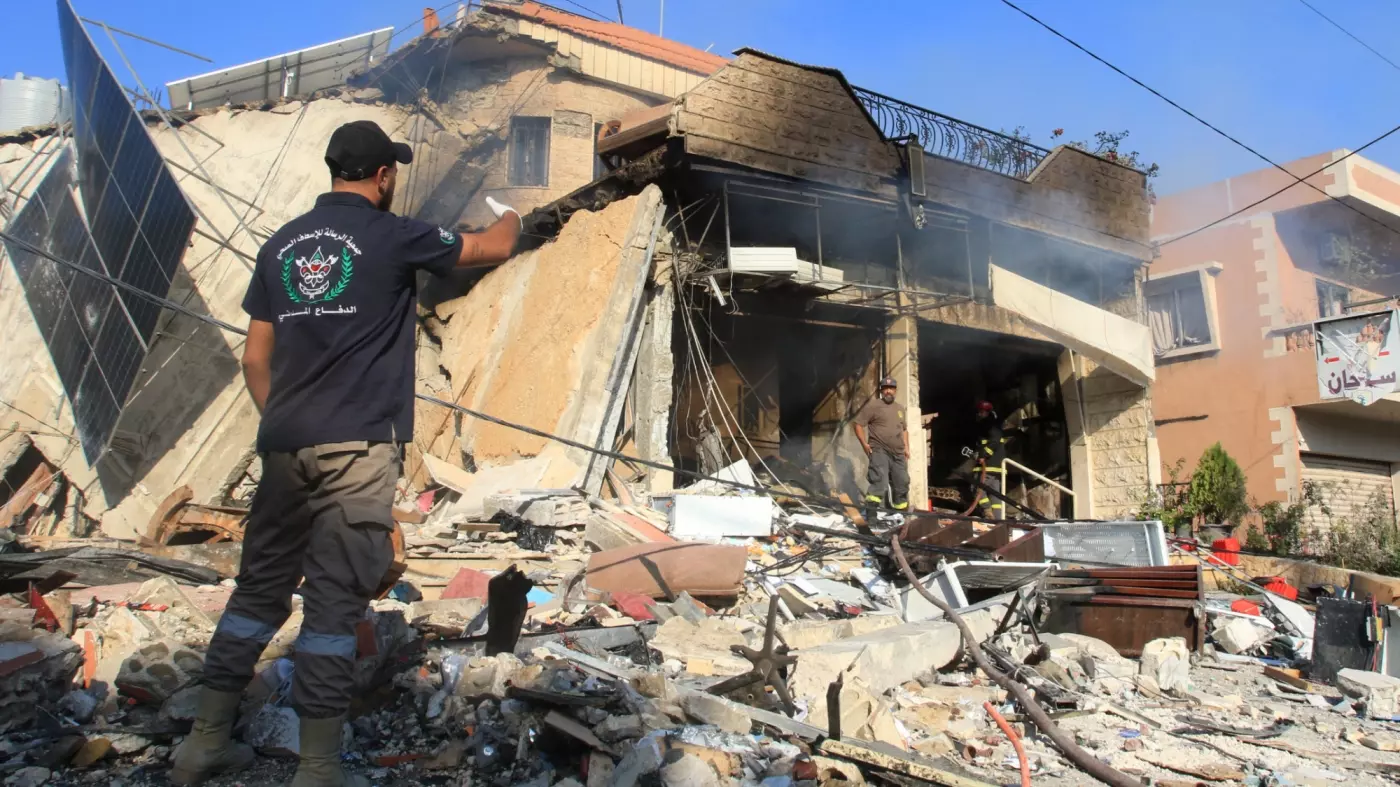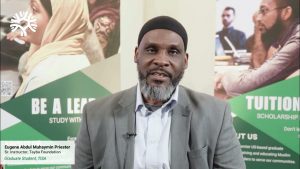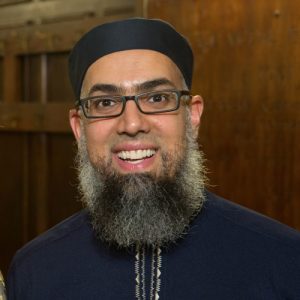Israel bombs refugee camps in Gaza, kills hundreds in Lebanon
Israeli soldiers raid Al Jazeera’s Ramallah bureau, ordering broadcaster to cease operations for 45 days.
Israeli soldiers raid Al Jazeera’s Ramallah bureau, ordering broadcaster to cease operations for 45 days.
Lebanon suffered its bloodiest day in decades as the Israeli airforce turned its gunsights north this week. Over five hundred people are confirmed to have lost their lives as Tel Aviv, which has exchanged fire with Hezbollah for nearly a year on the border, mounted a sweeping bombardment of the country’s south. It marked yet another escalation to coincide with the ongoing genocide in Gaza as well as Israel’s belligerence toward Lebanon, which has resulted in a number of invasions in the past fifty years.
The massive aerial bombardment throughout Lebanon, particularly its Shia-majority south, is confirmed to have killed at least 569 people in its first day. This days after Israel planned a brazen terrorist raid, detonating communication devices in public spaces that killed several people and injured hundreds. The Israeli government is bristling with fighting words. In one of several examples, education minister Yoav Kisch declared, “The way things are progressing at the moment, Lebanon will be annihilated…the price of aggression from Lebanon’s territory will be paid by the state of Lebanon.” He then added, “I am correcting myself: it will not be annihilated. Lebanon as we know it will cease to exist.”

A rescuer inspects the debris at the site of an overnight Israeli strike on a pharmacy in the southern Lebanese village of Akbiyeh on 24 September 2024 (AFP/Mahmoud Zayyat)
The pomposity of these words and the general aggressiveness of the Israeli position reflects the standard position of Tel Aviv, typified in a characteristically incongruous euphemism – “de-escalation through escalation” – with regards to Lebanon, supposing that a major assault will cow the Lebanese state and populace, perhaps with the result of overthrowing or purging Hezbollah or otherwise coming cap in hand for a meek surrender. It ignores the long history of Israel’s wars in Lebanon, all of which have been wholly unsuccessful and only served to bolster the ranks of militant groups such as Hezbollah.
BackgroundThe Lebanese border with the Israeli occupation of northern Palestine has been unquiet for the better part of the last year, with regular exchanges of fire almost since the Gaza genocide began further south. Hezbollah, which was originally formed during Israel’s 1980s occupation of Lebanon, largely dominates the Shia-majority south of the country. Since Palestinian militants originally ensconced themselves in the region during the 1970s Israel’s attitude has been one of collective punishment: making the Lebanese state and people pay for any acts of militancy with purposely disproportionate attacks.
That strategy peaked in the 1982 invasion of Lebanon, which advanced as far north as its capital, but although Israel did manage to expel much of the then-Fatah-led Palestinian resistance, they soon encountered various Lebanese opponents -most prominently Hezbollah- and were eventually forced to withdraw in 2000 after years of skirmishes punctuated with occasionally massive assaults that always featured the same pattern of collective punishment. This was formalized after the 2006 war with the Israeli military’s so-called “Dahia doctrine”, named after a suburb Israel heavily targeted, which called for wholesale and indiscriminate destruction as a form of political pressure. The architect of this brutalist doctrine, Gadi Eizenkot, is today a minister in the Israeli government.
With its major Iranian support, Hezbollah has often been earmarked both by Israel and by various Arab rivals as a rival: this is one of the enemies against which such Arab states as the United Arab Emirates and Bahrain have embraced American-brokered normalization with Tel Aviv. There is no doubt that the group has been historically effective in fighting Israeli attacks, and after it repulsed the 2006 Israeli attack, was widely portrayed as the world’s most effective non-state army. The group more contentiously brandished that ability in the Syrian war in the 2010s to help rescue the regime of Bashar Assad from a predominantly Sunni insurgency, draining much of its earlier goodwill. Nonetheless, the group’s legitimacy within Lebanon hinges on its image as “resistance”, primarily to the many Israeli attacks that have charred the country’s history.
Though its leader Hassan Nasrullah was careful not to commit himself to a full-scale war – conscious, likely, of Iran’s interests against such a conflagration – his group has nonetheless responded to the Gaza genocide with a series of raids on the Israeli border, which have marked a low-lying border war that has sent most settlers scuttling south for safety. Israel has killed several leading Hezbollah commanders – including its air commander Ali Burji, field commanders Abu-Taleb Abdullah, Abu Nima Nasir, and Jawad Tawil, and military chiefs Mohsen Shukr and more recently Tahsin Akil.
This autumn, as the Gaza genocide reaches a year, Israel has now decided to expand the war against the Lebanese state and its citizens.
Related:
– Israel Seeks Escalation For Latitude – The Regional “Conflict” Widens
– “In Our Thousands, In Our Millions” | The Palestinian Refugee Camps of Lebanon
The post Lebanon Faces Deadliest Day In Two Decades As Israeli Strikes Kill Over Five Hundred appeared first on MuslimMatters.org.
My friend and mentor Ayatollah Sayyid al-Milani, who has died aged 80, belonged to that rare breed, a traditionally trained Muslim cleric who was also a trailblazer in the advancement of inter-religious understanding.
Milani’s open-mindedness, forward thinking and widely recognised status as the spiritual leader of the UK’s 100,000-plus Shia community allowed him to provide guidance to British Muslims in difficult times, notably after 9/11, at the beginning of the invasion of Iraq and during the rise of Islamic State.
Continue reading...Business as usual is both repugnant and foolish.
Prosecutors say Iranians hacked SMS operator to send thousands of texts whose ‘aim was to create division’
Swedish prosecutors have accused Iran’s intelligence service of hacking an SMS operator in 2023 to send messages encouraging people to take revenge on protesters who had burned copies of the Qur’an.
Sweden’s prosecution authority said on Tuesday that 15,000 messages “calling for revenge” were sent in the summer of 2023 after a slew of protests involving desecrations of the Qur’an. “The aim was to create division in Swedish society,” the authority said.
Continue reading...Anti-Arab racism grips US politics and mainstream news media.
By Ibrahim Moiz for Muslim Matters
Previous Parts: Part 1 | Part 2 | Part 3 | Part 4
After the tumultuous 2023-24 school year, where American students protesting against the Israeli genocide at Gaza were vilified and repressed across the country, MuslimMatters interviewed chaplains Omer Bajwa of Yale University and Abdul-Muhaymin Priester of Grinnell College for their thoughts on these momentous events. In this third part of a five-part interview, the imams discuss the relationship of these events on interfaith relations, the impact that an institutionally approved genocide has left on non-Muslim communities, and the apocalyptic motivations behind much American support for Israel.
Oppressed and Oppressors Abdul-Muhaymin Priester: From a personal standpoint, speaking as a Muslim outside of anything else right now, I think one of the main things that we have to remember is that despite all of the suffering that we’re witnessing, despite how much confusion and anger that people may be experiencing, or sadness or whatever emotions they’re going through – this is from the Qadr (predestination) of Allah. Qadr is Qadaa’ (decreed). This is Divine determination of what’s going to happen and this is Divine decision about the outcome of whatever intentions or choices that we may have.
Abdul-Muhaymin Priester: From a personal standpoint, speaking as a Muslim outside of anything else right now, I think one of the main things that we have to remember is that despite all of the suffering that we’re witnessing, despite how much confusion and anger that people may be experiencing, or sadness or whatever emotions they’re going through – this is from the Qadr (predestination) of Allah. Qadr is Qadaa’ (decreed). This is Divine determination of what’s going to happen and this is Divine decision about the outcome of whatever intentions or choices that we may have.
This is one of the things that I kept trying to remind the students of in my khutbahs. Just to remind them that we have to get our minds out of that secular-religious paradigm that we were operating from, and we have to look at this strictly through the prism of, like I said earlier, this is Haqq, this is Batil. You’ve got Zalims (oppressors), you’ve got Mazloums (oppressed). These people are oppressing a particular people, and there’s nothing else to discuss about, anything else, period, for me.
And I think in seeing this we also have to remember that there is something that is very good that is coming out of this right now. We have seen an entire government, political, ideological structure get dismantled in front of our eyes in the last eight months. Allah has taken all of the money and time and everything that was invested into this idea called Israel, this apartheid state of Israel, and He’s turned it on its head.
Yes, they’re fighting to uphold it, but at the same time like we understand, the entire world outside of the United States and a few of their European allies, the opinion of the entire world has flipped on its head. And everyone has, in some aspect or other, it may not be in totality, but in one aspect or another, they have seen the reality of what this project is.
(Abdul-Muhaymin Priester continues:) This was never about making sure that they had a homeland. Now this is where the political aspect that we talked about earlier comes in. This was about making sure that they had a foothold in a region of the world that would allow them to continually make sure that they would disrupt any effort that Muslims could ever put forward into unifying themselves among one civilized form of leadership. That’s all this was ever about. It was about dismantling the Ottoman Empire and fracturing the Muslim world to the point where they didn’t have to worry about it as a polity any longer on the world stage.
And if you’re a student of political science or history [and] you think otherwise, you need to go back and take your degree back because it didn’t work for you. That’s all this ever was. That’s all it is right now…As Muslims we need to remember this is a situation of Haqq and Batil.
And this also should be an encouragement for us to get up and put in that work that we know we need to know. It doesn’t have to do anything with being belligerent, bellicose, none of that. This is about putting in the work in order for Haqq to triumph over Batil, end of discussion. Whatever manifestation that comes through, because like we talked about – yes there’s Muslims participating, there are voices that are being heard, but we should have been the ones leading the charge from day one. Anybody who came to participate in anything that had to do with this situation with our brothers and sisters should have been coming to join us, we shouldn’t have been going to join them. Because, end of the day, these are our brothers and sisters.
And yes, everybody [will] have their questioning on the day of Yaumul-Qiama, but as Muslims we’re the ones who hold a responsibility, and we’re going to get questioned about it in some form or another for some reason, whatever capacity that we were responsible for.
I Want the Students to Know We Care Omer Bajwa: What I would say is definitely, as a chaplain, as a spiritual advisor and spiritual caregiver to our campus community, I want them, the students and the readers to know that we care so deeply and are so impressed with their activism, their civil disobedience – this is a great American tradition, right? First Amendment right to free assembly, to free speech, to civil disobedience? Our students, our communities are understanding that this is so effective and critical and essential to this conversation.
Omer Bajwa: What I would say is definitely, as a chaplain, as a spiritual advisor and spiritual caregiver to our campus community, I want them, the students and the readers to know that we care so deeply and are so impressed with their activism, their civil disobedience – this is a great American tradition, right? First Amendment right to free assembly, to free speech, to civil disobedience? Our students, our communities are understanding that this is so effective and critical and essential to this conversation.
Then, (to know that) we care for them. As the imam said, at the end of the day, from our spiritual lens, this is about Haqq and Batil, Haqq versus Batil. There’s a great moral and ethical awakening that is happening in front of our eyes. They’re asking very deep, existential, and spiritual, and philosophical questions – they’re grappling with these issues in real time, they’re seeing this. There’s a great unveiling going on about power, and about hypocrisy, and about obfuscation, and about lies.
And this is, like – you’re getting a front row education in the way the world works, is what I would say. We’re seeing that especially on college campuses. And as chaplains who work alongside these communities, we’re walking with them through this.
End of Interview
Related:A Tide Is Turning: The Capitol Consensus On Israel Is Crumbling
The post University Chaplains’ Perspective On Campus Protests [Part V] – A Situation Of Haqq And Batil appeared first on MuslimMatters.org.
Dr. Majed Jaber warns that coming rainy season will exacerbate humanitarian disaster in tent shelters.
A new exhibition reveals the traditions that have come to define food in the Islamic world and the artistry involved
The second-largest religion by population after Christianity, Islam covers a vast geographic area, ranging from Spain to north Africa and the Middle East, through central and south-east Asia, Indonesia and beyond. The various culinary traditions that exist in this broad geography are equally sizable, making for a truly bounteous range of food – as well as accompanying servingware, art, cookware, cookbooks and much more. Approaching the Islamic artistic tradition by way of its culinary culture, the new exhibition at the Detroit Institute of Arts (DIA), The Art of Dining: Food Culture in the Islamic World, collects more than 250 works of art and artefacts to give audiences a taste of this remarkable history.
According to the show’s curator Katherine Kasdorf, gourmet culture in the Islamic world goes back to the 9th century in Baghdad, with everyday recipe books arriving around that time and a proliferation of art and items related to cooking and eating. Islamic culinary culture was closely linked to the religion’s artistic tradition, making the two of them deeply entwined. “I’m hopeful that people will be interested in the food angle, so the exhibit will attract those who might not otherwise be drawn to an exhibition of Islamic art,” Kasdorf said. “Hopefully they’ll develop a new appreciation for art from these regions.”
Continue reading...Ethics, aesthetics and philosophy are all intertwined in the poetry of Hafez and his words help us to rediscover long-lost truths
There are few poetic traditions in the world that have entrenched themselves so deeply in their respective societies as has the Persian poetic tradition. This presence, however, is not limited to discussions within literary circles or the adornment of public monuments. Nor is it strictly a source of aesthetic beauty. Within Persian speaking societies, people from all walks of life consult poetry for profound spiritual instruction or genuine guidance for the big decisions in life. This is particularly the case with Hafez.
Within the pantheon of Persian poets, perhaps none is as cherished and revered as Hafez, and with good reason. Reading the poetry of Hafez induces fragmented moments where one oscillates between body and soul; indeed, Wheeler Thackston writes that Hafez “sang a rare blend of human and mystic love so balanced, proportioned, and contrived with artful ease that it is impossible to separate the one from the other”. Within his poetic lines are levels and layers, each unfolding simultaneously upon the page and within the reader. Ethics, aesthetics and philosophy are all intertwined, and all possible meanings simmer simultaneously beneath the surface.
Continue reading...Many of us love reading fiction for leisure. There’s nothing like curling up with a good book or mindlessly cleaning while listening to an audiobook. However, it’s hard to find “good books” that we can’t wait to rip open and read, and even harder to find books that have some type of “Islamic benefit” in them. Finishing a novel involves investing a considerable amount of time and time is precious. Sometimes Muslims may feel guilty for spending so much time reading a fictionalized story instead of engaging in something more “worthwhile;” whether that’s reading a spiritual text or another activity we’d easily call a good deed. Those of us who love to read fiction may find that reading a good story is essential for our mental health. So how can we take a relaxing activity and turn it into something that we may be able to benefit from in this life and the next?
Critical Islamic Mindful Reading: A Reading ApproachAs a high school English teacher myself, I never think reading fiction is simply an exercise of reading comprehension or a “waste of time,” especially when we approach whatever we’re reading mindfully. The biggest reason reading for pleasure can be so valuable is because fiction provides a safe space for us to explore and discuss personal and social issues. Using the characters and the fictionalized story, we don’t have to enter into the world of gossiping or backbiting in order to explore the messiness of life. Having a perspective from within a novel allows us to deeply empathize with the characters and better understand the complexities of the situations they experience.
My mindset of trying to find valuable lessons in whatever I read started when I was a high school student. I would obsessively read all of my assigned novels for school and think–but what does Islam think about these stories and characters? What can I learn from this book to benefit me in my own life? When I got to college, I started asking, what Islamic stories from the Quran and Sunnah does this remind me of?
These questions are essential to my approach to “critical Islamic mindful reading.” This mindful reading approach is inspired by “sacred reading,” which involves treating a secular, non-religious text similar to a sacred scripture–what does the novel teach you or guide you towards? Obviously nothing compares to the guidance provided by the Quran, so please don’t misunderstand this concept. That is where the critical part of this approach comes in. The ultimate source of wisdom and guidance is Allah  –so always put Islamic ideas and teachings at the forefront of your mindful reading practice. Rooting this whole process in Islam is at the crux of this mindful reading approach and helps you explore your faith in a rigorous, healthy way.
–so always put Islamic ideas and teachings at the forefront of your mindful reading practice. Rooting this whole process in Islam is at the crux of this mindful reading approach and helps you explore your faith in a rigorous, healthy way.
Once you’ve made some decent progress in the novel or finished it, figure out what major topics the novel explores that you want to spend some time thinking about. Is it patriarchy? Mental health? Sexuality? Racism? Materialism? Now it’s your job to do some research on the side and get your bearings within Islam’s general approach on these topics. What does Islam say about patriarchy? You can look up articles on MuslimMatters, lectures on YouTube, find books, or talk to your learned friends or imam. You may also prepare more detailed questions, such as–does Islam value women’s engagement in society?

PC: freestocks (unsplash)
It’s hard to find a “100% Halal” book, and what does that mean anyway? While I can’t pin down what could be a completely faultless book from an Islamic standpoint, it is relatively easy to determine what content crosses the line too many times or too extravagantly. For example, in Prophet Yusuf’s  story, he faces the temptation to have an illicit relationship with a married woman. But how does the Quran describe and handle this content? There may be some gray area in this conversation and it is one I am not qualified to hold, but having a personal standard that respects Islamic boundaries is important.
story, he faces the temptation to have an illicit relationship with a married woman. But how does the Quran describe and handle this content? There may be some gray area in this conversation and it is one I am not qualified to hold, but having a personal standard that respects Islamic boundaries is important.
Once you’ve found a book that passes some sort of litmus test, there may still be some problematic moments or undercurrents. As you’re reading the novel and you’re finding objectionable things, note the highly problematic things that go against Islamic teachings and lifestyle. For example, is there an abusive relationship between family members or a character who steals? It’s important to not desensitize ourselves from major sins and to simply call them what they are.
The Method for Critical Islamic Mindful ReadingHere are the three questions that will guide your mindful reading:
Find something from the Quran or Sunnah related to the story. It can be an example or a non-example.
I’ll give you some examples. In To Kill a Mockingbird, there is a false rape allegation that reminds us a lot of the incident with Prophet Yusuf  and the governor’s wife. Let’s move on to a non-example. In Fahrenheit 451, Guy Montag finds a new calling at his doorstep, much like the prophethood of Muhammad
and the governor’s wife. Let’s move on to a non-example. In Fahrenheit 451, Guy Montag finds a new calling at his doorstep, much like the prophethood of Muhammad  . The husband-wife relationship between Guy Montag and his wife, Midlred, is the polar opposite of the support and love between the Prophet Muhammad
. The husband-wife relationship between Guy Montag and his wife, Midlred, is the polar opposite of the support and love between the Prophet Muhammad  and his wife Khadijah
and his wife Khadijah  .
.
Think about these examples and suss out how they relate to the novel you’re reading. Wonder about what these examples say when you put them in conversation with each other. This level of reflection and pondering might lead you to new insights into familiar Islamic stories, not just a way to think about the novel you’re reading!
Step 2: Islam’s Stance on a Novel’s Big QuestionsTackle the big questions that the novel asks while thinking about what Islam’s answer would be to the same questions. This is a great way for you to make sense of what you’re reading within an Islamic paradigm.
Here are some examples. What would Islam say about the materialism in The Great Gatsby? You may think of multiple parts of the Quran that teach us about the never-ending obsession with the dunya [Surat at Takathur, 102] and the lack of focus on doing good for the Hereafter [Surat al Kahf, 18:46] to come up with your stab at an Islamic answer, or a “thesis statement” or “claim.”
Islam condemns the obsession with materialism in The Great Gatsby as a never-ending pursuit of unquenchable desires for the dunya that not only distracts from but also compromises people’s success in the akhirah.
If you think about the notion of hearts finding ease in their spiritual connection to their Creator [Surat al Raad, 13:28], you may wonder about the pursuits of the characters in The Great Gatsby.
To find peace and satisfaction, Gatsby should focus on his relationship with Allah  as the most important relationship he prioritizes in his life instead of his relationship with Daisy.
as the most important relationship he prioritizes in his life instead of his relationship with Daisy.
Here’s another (though non-bookish) example. Thinking of the animated Disney film, Encanto, Isabella is being forced into an engagement/marriage that she doesn’t want to be a part of–which is the opposite of what Islam preaches. The consent of the bride is necessary for a valid Islamic marriage and is one of the rights Islam reinforces for women.
The wishes and desires of a young woman regarding major life decisions are something a family should always honor and seek to be aware of through positive family interactions.
Or
Young women can easily be taken advantage of and should be protected and treated with extra care because of their vulnerable position in families and society.
What’s the point of going through this question? It’s using a novel as a case study for real life that allows you to explore messy, complex issues in real life. The world is far from perfect and identifying the Islamic paradigm helps us read mindfully and can protect us when life’s tests become overwhelming.
Step 3: Lessons Learned from the Novel
PC: Ben White (unsplash)
The last thing you’ll want to talk about is the benefits of reading this book as lessons you can take forward with you into your own life. This imbues mindfulness into your “just for kicks” reading and provides you opportunities to develop your own wisdom without having to suffer through the experiences in the novel themselves.
Here are some examples from novels I’ve already mentioned earlier in this post.
Fahrenheit 451: Your spouse may have huge changes or upheavals in their life. It’s important to hear them out and support them, as long as they’re doing something good, to keep the marriage strong.
The Great Gatsby: Don’t put someone in the place of Allah  in your own life. Setting your whole life in pursuit of someone or something other than Allah
in your own life. Setting your whole life in pursuit of someone or something other than Allah  is like worshiping that person or thing–and nothing is infinite, pure, or worthy of that attention other than Allah
is like worshiping that person or thing–and nothing is infinite, pure, or worthy of that attention other than Allah  .
.
I wish you the best as you embark on these exciting literary journeys. You may find yourself shaken to the core at your findings! I hope you can use this mindful reading practice in book clubs and with readings from various media, like movies and podcasts. I pray that critical mindful reading is something you can benefit from and share with others.
Related:
– Navigating Muslim Representation In Books: The Good, The Flawed, And The Ugly
The post A New Way To Read Fiction: Critical Islamic Mindful Reading appeared first on MuslimMatters.org.